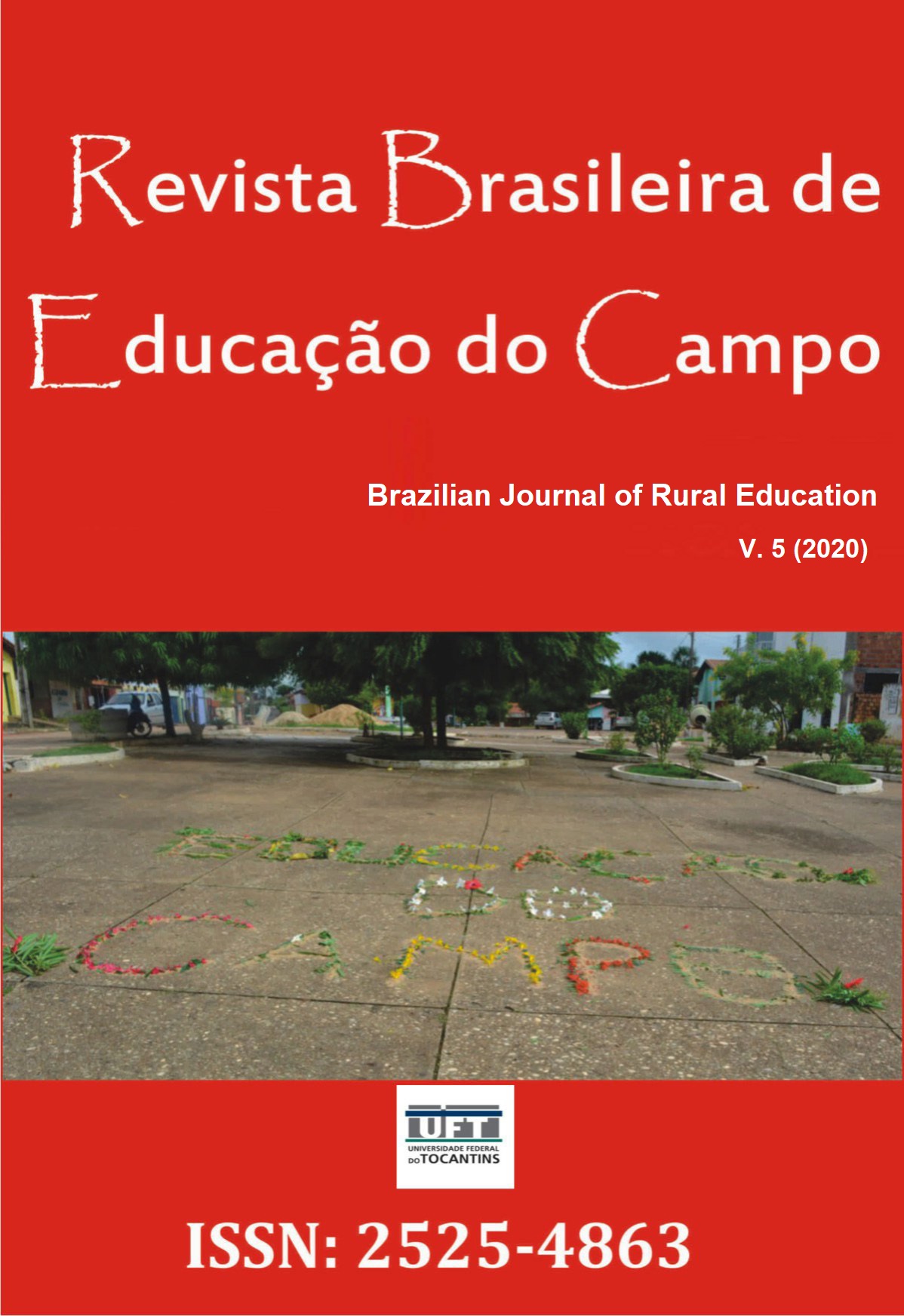Outlook of Licentiate Degree Courses for Rural Education in Brazil
DOI:
https://doi.org/10.20873/uft.rbec.e5820Abstract
ABSTRACT. This text presents the results from a study that aimed to map the existing Licentiate Degree Courses for Rural Education in the different Brazilian states, as well as comparing such offer to the existing rural population an obtain the demand per region and thus reflect upon the importance of providing opportunities for specific teacher formation for the rural. The research is characterized as a quantitative survey, whose data were obtained through document analysis. This data survey was carried out by means of consulting the e-Mec portal during the month of May 2018 and considered the registered and functioning courses in the base year of 2017. It identified 61 Licentiate Degree Courses for Rural Education in the country, 29 of which in the classroom attendance modality and 2 in the Distance Education (DE) modality. The Northeastern region offered the highest number of courses with a total of 8. In contrast, the Midwestern region has the lowest offering, accounting for only 4 courses. The country has a rural population of over 30 million, there are states with over 1 million inhabitants in the rural zone but no teaching institutions offering Licentiate Degree Courses for Rural Education. Although there has been an increase in the offering of such courses in the country when compared to previous studies, there is still a need for public policies aimed at providing opportunities of offering such specific training in such a way as to balance out and meet the demands by Brazilian regions and states.
Downloads
Literaturhinweise
Brasil. (2001). Parecer nº 36 de 04/12/2001: Diretrizes Operacionais para a Educação Básica nas Escolas do Campo. Brasília: CNE/MEC. Acesso em 6 de junho de 2018. Recuperado de: http://portal.mec.gov.br/index.php?option=com_docman&view=download&alias=6803-pceb036-01&Itemid=30192
Brasil. (2007). Educação do Campo: diferenças mudando paradigmas. Brasília: MEC. Acesso em 09 de maio de 2018. Recuperado de: http://red-ler.org/educacaocampo.pdf
Brasil. (01 de junho de 2010). Censo 2010. Fonte: IBGE: https://censo2010.ibge.gov.br/sinopse/index.php?dados=8
Brasil. (2013). Programa Nacional de Educação do Campo (Pronacampo). Brasília: MEC. Acesso em 07 de março de 2018. Recuperado de: http://pronacampo.mec.gov.br/images/pdf/bib_educ_campo.pdf
Brasil. (04 de abril de 2014). Área territorial por estados. Fonte IBGE: http://archive.is/Gekj7
Brasil. (18 de março de 2019). Censo Escolar 2018. Notas Estatíticas. Fonte: INEP: http://download.inep.gov.br/educacao_basica/censo_escolar/notas_estatisticas/2018/notas_estatisticas_censo_escolar_2018.pdf
Caldart, R. S. (2009). Educação do Campo: notas para uma análise de percurso. Trabalho, Educação e Saúde, 7(1), 35-64. https://doi.org/10.1590/S1981-77462009000100003
Ferreira, M. J., & Molina, M. C. (2014). Desafios à Formação de Educadores do Campo: tecendo algumas relações entre pensamentos de Pistrak e Paulo Freire. In Molina, M. C. (Org.). Licenciaturas em Educação do Campo e o ensino de Ciências Naturais: desafios à promoção do trabalho docente interdisciplinar (pp. 126-153). Brasília: MDA.
Fonseca, J. J. (2002). Metodologia da pesquisa científica. Fortaleza: UECE.
Gatti, B. (2004). Estudos quantitativos em educação. Educação e Pesquisa, 30(1), 11-30. https://doi.org/10.1590/S1517-97022004000100002
Ghedini, C. M., Onçay, S. T., & Debortoli, S. F. (2014). Educação do Campo e prática pedagógica desde um viés freireano: possibilidade de construção da consciência e da realidade. In Molina, M. C. (Org.). Licenciaturas em Educação do Campo e o ensino de Ciências Naturais: desafios à promoção do trabalho docente interdisciplinar (pp. 83-109). Brasília: MDA.
Gil, A. C. (2008). Métodos e Técnicas de Pesquisa Social (6ª ed.). São Paulo: Atlas.
Matos, K. S., & Lerche, S. V. (2001). Pesquisa educacional: o prazer de conhecer. Fortaleza: Demócrito Rocha.
Molina, M. C. (2014). Licenciaturas em Educação do Campo e o Ensino de Ciências Naturais: desafios à promoção do Trabalho Docente Interdisciplinar. Brasília: MDA.
Molina, M. C. (2015). Expansão das licenciaturas em Educação do Campo: desafios e potencialidades. Educar em Revista, (55), 145-166. https://doi.org/10.1590/0104-4060.39849
Molina, M., & Antunes-Rocha, I. (2014). Educação do Campo: História, Práticas e Desafios no âmbito das Políticas de Formação de Educadores – Reflexões sobre o Pronera e o Procampo. Reflexão e Ação, 22(2), 220-253. Fonte: https://doi.org/10.17058/rea.v22i2.52
Santos, J. (2019). Educação do Campo, multisseriação e formação de professores. Revista Brasileira de Educação do Campo, (4). https://doi.org/10.20873/uft.rbec.v4e3834
Veröffentlicht
Zitationsvorschlag
Ausgabe
Rubrik
Lizenz
Creative Commons Attribution License
Creative Commons Attribution License
Proposal for Copyright Notice Creative Commons
1. Policy Proposal to Open Access Journals
Authors who publish with this journal agree to the following terms:
A. Authors retain copyright and grant the journal right of first publication with the work simultaneously licensed under the Creative Commons Attribution License that allows sharing the work with recognition of its initial publication in this journal.
B. Authors are able to take on additional contracts separately, non-exclusive distribution of the version of the paper published in this journal (ex .: publish in institutional repository or as a book), with an acknowledgment of its initial publication in this journal.
C. Authors are permitted and encouraged to post their work online (eg .: in institutional repositories or on their website) at any point before or during the editorial process, as it can lead to productive exchanges, as well as increase the impact and the citation of published work (See the Effect of Open Access).














